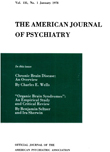Abstract
During the last two years twelve children were studied and treated for severe emotional disturbances following mild upper respiratory infections. An attempt has been made to describe the observed emotional disturbances characterized by compulsive, obsessive and phobic behavior in a setting of mild anxiety and depression. The initiating illness was variously diagnosed as "flu," "grippe," "cold," "sore throat." The febrile responses were low; the children did not appear acutely ill. During the respiratory infection a quasi-delirium, marked by apprehension without clouding of consciousness and of short duration, ushered in the anancastic behavior. Anancasms persisted for about six months. All children recovered within nine months after onset of illness. [SEE CHART II IN SOURCE PDF]. During the heights of the emotional illness the children were apprehensive, preoccupied, demanding, self-accusatory, labile in mood, very slightly retarded. Obsessive thoughts and compulsive activity was marked.
Specific etiological factors could not be determined. Attempts to correlate the illness with bacteriological agents, vitamin deficiency, and drug intoxications were unsuccessful.
Differential diagnoses between post-influenzal conditions, chronic encephalitis, deliria, anxiety states, manic-depressive phenomena and classic "compulsion neurosis" were considered.
A survey of the possibly pertinent literature did not reveal descriptions of this type of symptomatic neurosis in association with mild upper respiratory infections.
Emphasis was placed on the type of personality which succumbed to this illness. In all instances the children were subservient, docile, cowed by authority, perfectionistic in their strivings and meticulous in personal habits. As a group they were repressed and non-aggressive. Probably, because of these qualities, they were valued in society. Their conforming attitudes masked the underlying capacities for psychopathological manifestations.
From observations in intensive psychotherapy it seems justified to conclude that these children had difficulty in expressing appropriately their inherent hostile and aggressive thoughts and feelings. With illness these aggressive tendencies became manifest and dominant, and the patients attempted to cope with them by anancastic behavior. Although the initiating illness was an upper respiratory infection, the children stressed the fact of becoming sick and invariably interpreted the illness, per se, as "punishment" for some ununderstood "naughtiness" or "wickedness" with associated strong feelings of guilt. When the individual recognized his particular hostile-aggressive desires, and learned to channel them effectively, the anancasms disappeared. With the conclusion of therapy, these children ultimately reestablished themselves in their society better adjusted than prior to the onset of illness.

